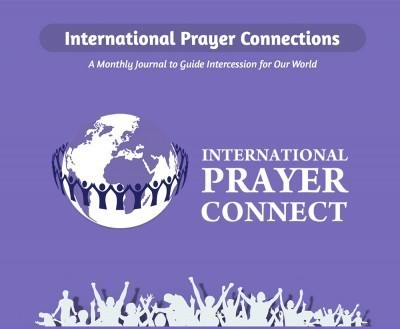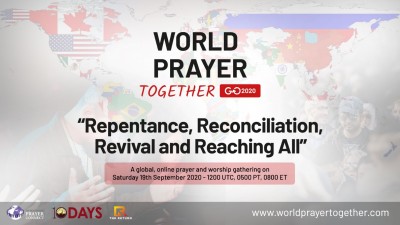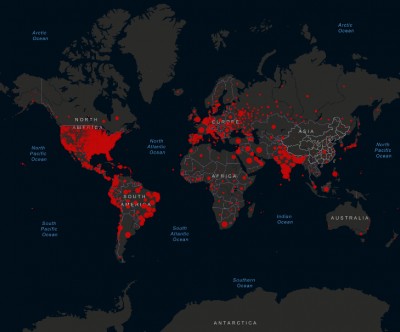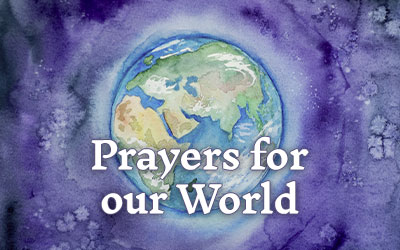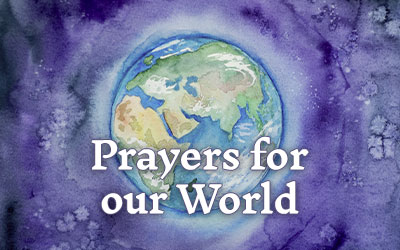‘The Return 10 Day Prayer Plan’ Download
03 Sep 2020The Return 10 Day Prayer Plan has been produced by 10Days.net and theReturn.org as part of the 10 Days of Prayer taking place between September 19 and 28th 2020.
HOW TO USE THIS PRAYER PLAN
Every day we start with a Prayer of Adoration. Why do we pray this way?
It’s been said that “A picture is worth a thousand words.” When we are able to “taste and see” God (PSALM 34:8), our hearts are alive because we can both receive love from Him and give love to Him.
IN ADORATION WE:
- Praise His character.
- Acknowledge His attributes.
- Describe His beauty.
- Worship Him as Savior.
In the Father’s redemptive plan, it is His intention for Jesus, “the image of the invisible God” (COLOSSIANS 1:15), to be seen, known, and worshipped by every tribe and tongue throughout the nations of the earth. Praying the Bible and worshiping Jesus for who He is, joins the prayer and worship in Heaven (REVELATION 4) that continually adores Jesus in this way.
REPENTANCE is our acknowledgment that we are not where He is, but want to turn
from our ways to align with Him.
INTERCESSION is agreement with what God has promised to do.
Why do we anchor our prayer and intercession in the Bible?
- The Bible is God’s language, the language of His heart, the language of Heaven.
- The Bible is positive in nature and encouraging to our spirit and renewing to our minds.
- The Bible is faith-filled and has no doubt or unbelief.
- The Bible creates unity in God’s people as we pray and worship from it.
MEDITATION focuses on our ‘take away
Greetings!
We are pleased to bring you IPC Connections for September 2020.
There has been a sensing among prayer leaders around the world of a significant corporate calling to identificational repentance for our nations. We have been led simultaneously to draw the Church together to pray concertedly in the spirit of ‘If my people…’ (2 Chron 7:14) for the healing and renewing of each of our lands. This has culminated in a number of online events and initiatives that are taking place over the next 2 months. Some of these are detailed in this edition of IPC Connections.
With this calling to repentance in mind, we are grateful to IPC’s Senior Advisor and co-founding member, Brian Mills for his editorial article this month, entitled: ‘Preparing for his Return!’ The article relates the times that we are in to 2 Chronicles 7:13-14 and reminds us of the significance of repentant prayer and reconciliation and why this is an important place to begin - if we are genuinely and earnestly seeking the renewal and transformation of our nations.
We would invite all of our partner networks to join us for the first of these united prayer events, which will be a World Prayer Together call on Saturday, September 19th, at 1200 UTC, (5 am PT, 8 am ET, 3 pm Jerusalem time). See the article below for more info and visit our website to join the call www.worldprayertogether.com.
The Covid-19 pandemic has now affected 25 million people worldwide. We bring you up to date information on this along with prayer points and links to various resources. A number of countries are facing challenges at this time; we are highlighting the situation in North Korea and praying earnestly for a breakthrough and for ‘one unified Korea’.
International Prayer Connections is produced and distributed freely each month to inform God's praying people around the world. We are grateful to those who have given generously to enable this to happen and continue to need such support for this and our other transformational prayer initiatives. If you would like to make a gift towards our costs by giving through our funding arm, the Transformation Prayer Foundation, we would appreciate it. Please click here.
Thank you for continuing to partner with us in mobilising and informing united prayer across nations, denominations, movements, and generations for the fulfilment of the Great Commission.
May we express grateful thanks to Andy Page and the IPC Editorial Team who put this email together each month.
Wishing you His continued blessings,
Jason Hubbard - Executive Coordinator
John D Robb – Chairman
International Prayer Connect
What a subject! What a year! What an occasion! To be able to connect praying people around the world has never before in history been possible until recently. And this has all gathered pace in the season we are in as the world is alarmed and the church is awakened by this coronavirus pandemic.
For sure, we are all living through times of unparalleled challenges and change. Countless millions around the world are affected – but how we each respond will determine the outcome. It’s not just about the pandemic, but it’s also about our ways of life, our economies, our future and that of our children. So how should the church respond?
One night king Solomon had a divine encounter, in which God said “When I shut up the heavens so that there is no rain, or command locusts to devour the land, or send a plague among my people, if my people, who are called by name, will humble themselves and pray and seek my face and turn from their wicked ways, then I will hear from heaven, and I will forgive their sin and will hear their land” (2 Chronicles 7.13-14).
In the past year or so Australia and parts of the United States have had unprecedented lack of rain, and consequently huge bush fires displacing thousands of people. East African countries have suffered from plagues of locusts described as of “biblical proportions”. Parts of China and South Asia have experienced catastrophic and devastating floods. And the plague of “Covid 19” has claimed the lives of over a million people and affected the lives and livelihoods of many millions more. So how should the church respond?
Some parts of the world continue to suffer appallingly because of ongoing conflict and terrorism. Others have had to face up to ongoing discrimination between black and white on the back of the historic slave trade. Meanwhile a more modern slavery scandal has been largely unnoticed. Human trafficking of many thousands of people across borders – regarded as “refugees” or “migrants” - include thousands of children and young people, being sold both for sexual exploitation and for what is termed the “harvesting” of human body parts - a practice that is both sickening and inhumane. Political upheaval also continues in many nations. I’ve lost count of the number of corruption investigations and trials that are in progress among national leaders in multiple countries. So how should the church respond?
I think we need to fall on our knees before God and cry out – “God have mercy upon us”.
“But”, some may think, “much of this is not church sin.” No, but we are part of this world. The apostle Paul said “we are all God’s offspring.. and commands all people everywhere to repent” (Acts 17.29-31). Repentance is not an option – it is a command! And if we as God’s chosen followers – whether Jewish or Christian – do not set the example, how can the rest of the world be expected to follow suit? God watches and waits for those who are in tune with Him to “stand in the gap”.
We can start by repenting of our own personal sin and sins. “If we say we have no sin, we deceive ourselves and the truth is not in us” (1 John 1. 8-10). Solomon (a king who was flawed in character, but nevertheless knew what God required) reminded us in Proverbs 6 that there are seven things that God hates – haughty eyes, a lying tongue, hands that shed innocent blood, a heart that devises wicked schemes, feet that are quick to rush into evil, a false witness who lies and anyone who stirs up conflict in the community.
And then there are the many corporate sins that exist – both current and historic. Sin that is not repented of is not swept under the carpet. Heaven remembers them. King David had to deal with the sin of his predecessor, Saul, when he shed the innocent blood of the Gibeonites (see 2 Samuel 21), and Jesus accused the Jewish leaders of His day of the unrepented sins of history, including the killing of their prophets hundreds of years previously - “and so upon you will come all the righteous blood shed on earth” (see Matthew 23 v. 13 onwards, and particularly v.35-36). That is huge!
And then comes this cry from the heart of Jesus and the courts of heaven “how often I have longed to gather your children together, as a hen gathers her chicks under her wings, and you were not willing!” Here is the expression of mercy and love and compassion – but He was unable to show it because there was sin in the way in history, and in them His people.
So how are we, His people, going to respond to this in our day? We need to take the promise within 2 Chronicles 7.14 seriously, and realise that God said He would respond when we do what he looks for. Humble ourselves, Pray, Seek His face, and Turn from our wicked ways. When we do that, perhaps then, God can do what He promises – hear our prayer, forgive our sin and heal our land – wherever we are.
But we need to do that representationally, identifying with the sin and with those who have committed that sin or those sins.
As a European I need to confess and repent of so many things. The shedding of innocent blood in particular. Europe is the most blood-stained Continent in the world, and yet it was the Continent that God called the apostle Paul to come and evangelise. Oh, yes we sent our missionaries around the world, but we ourselves have become spiritually destitute. We have largely turned away from God and embraced a secular way of life. In this Continent various “isms” have been birthed and then influenced the rest of the world – existentialism, humanism, secularism, Communism, Nazi-ism, materialism, and so on. And then there are the church divisions that have been both historic and contemporary – are we prepared to own up to them?
As a white British male, there are many sins I need to confess, acknowledge and turn from - to do with racial superiority or colonialism – the list is endless. And for those from other parts of the world there may be reciprocal ingrained attitudes that may have been caused by those corporate sins. There may be tribal, or nationalistic or political hatreds and inbred, generational or family prejudices and resentments, giving rise to ongoing acts or attitudes of revenge.
What happens when we do what God is asking of us? Then He begins to bring forgiveness into marred human relationships and between tribes and nations. When we apologise in public for the sins of our group or nation, something shifts. Those on the receiving end of such apology frequently testify “something broke in my spirit” or “I never before realised I had such antagonism towards you or your nation – but God has revealed it and dealt with it”. If that happens at the human level – what has also happened in heaven?
Many of us in the International prayer and Reconciliation movements have numerous stories of what God has done as a result of public acknowledgement of sin coupled with genuine repentance. Tears have flowed, forgiveness has been expressed, relationships healed. Wars have ceased, enemies have been reconciled, land has been healed – literally, and national change has occurred. Politicians and royalty have made public apologies, changed national policies, engaged in acts of retribution. And if that has happened at national level and in the hearts of ordinary people, we can only conjecture as to how our Father in heaven has felt. For sure, He will know that the sacrifice of His Son on the Cross has not been in vain, but has accomplished all this and much more.
But there is more that God will do. He wants the whole world to know of His love. One of my mentors was the late Dr. J Edwin Orr. He used to ply me with stories of what happened in times of revival or spiritual awakening. He would frequently point out that every revival in history has been preceded by “extraordinary prayer” and “produced an unusual conviction of sin, resulting in repentance, confession, reconciliation and restitution, with great concern for the salvation of sinners near at hand and far away.”
Isn’t that what we are looking for in this season? Isn’t that what God is also looking for? The timing of God’s answers is in His hands. We can’t insist that He does what He promised. But we can be sure that He will.
Many books have been written telling some of the stories – too many to be listed here! But maybe, if you have time to watch, this dialogue produced some years ago for an American TV channel might help to whet your appetite.
Let’s humble ourselves, pray, seek His face, and turn from our wicked ways. Then perhaps He will turn the hearts of many towards His Son before His Return.
Brian Mills – Interprayer | International Prayer Connect Leadership Team
Saturday, September 19th, 1200 UTC, 5 am PT, 8 am ET, 3 pm Jerusalem time
"Repentance, Reconciliation, Revival and Reaching All"
Join millions of believers around the world for this global online prayer and worship gathering as we mark the beginning of the GO2020 Decade which aims to reach every person with the Gospel by 2030.
If my people, who are called by my name, will humble themselves and pray and seek my face and turn from their wicked ways, then I will hear from heaven, and I will forgive their sin and will heal their land. 2 Chron 7:14...
Ministry leaders representing 10 world regions will “stand in the gap”, identifying and confessing major corporate sins that characterize their regions as those from other regions empathize and pray for revival and mission breakthroughs for each of those regions. Worship will be led by groups from across the nations.
Worship | Holy Communion | 10Days.net | TheReturn.org | Blowing of the Shofars
Werner Nachtigal, Global Outreach Day, www.go2020.world
Jonathan Friz, 10 Days of Prayer, www.10days.net
Grant Berry, Reconnecting Ministries, www.Reconnectingministries.org
Jason Hubbard, International Prayer Connect www.ipcprayer.org
John D Robb, International Prayer Connect 1 www.ipcprayer.org
TO CONNECT WITH WORLD PRAYER TOGETHER...
LIVE on 19th September 1200 UTC, 0500 PT, 1500 Jerusalem Time
in 10 languages – go to
www.worldprayertogether.com
Share this event with everyone you know!...
- Email the flyer to your contacts
- Like, share and comment on our Facebook and Instagram pages.
- Sign up for our IPC Connections Emails
“Ask the Lord of the harvest, therefore, to send out workers into his harvest field.” Math 9:37.
Sow in to the work and ministry of World Prayer Together
and International Prayer Connect with a donation:
‘10 Days’ Joins ‘The Return’ in Calling Christians to Worldwide Prayer, Fasting, Repentance
Thousands To Converge on Washington Mall for ‘The Return’ on Sept. 26, Flanked by Prayer Inspired by Ancient ‘10 Days of Awe’' Sep 18-28, 2020
NEW YORK—As political discord and a pandemic threaten societies around the world, prayer movements are gaining momentum and some have united to shape a global Christian revival with Washington, D.C., at its epicenter.
Thousands of Christians and more than 100 denominations of churches have committed themselves in prayer and collaboration leading up to “The Return: National and Global Day of Prayer and Repentance.”
“The Return” (TheReturn.org) is set for 40 days before the presidential election, and on the 400th anniversary of the sailing of the Mayflower, in the days of America’s founding and dedication to God. Surrounding the “The Day of Return” on Sept. 26 at the Washington Mall will be 10 days, known from ancient times as the Days of Awe, to be set as a special time of prayer and repentance on Sept. 18-28.
“10 Days” (10days.net), a movement of prayer, fasting, and repentance in unity based on the 10 Days of Awe, has been invited to collaborate with “The Return” as movement leaders call Americans to turn from sin and humble themselves before God.
“We are in the midst of a multi-faceted crisis right now, a crisis that no human being knows how to solve,” said “10 Days” leader Jonathan Friz. “An insoluble problem should lead us to self-reflection. What if instead of blaming one another, we took time to consider how our own actions and self-will have contributed to the current state of political division, racial strife, pestilence? What if instead of placing ourselves on a pedestal as judge, we would humble ourselves before the only Judge, and seek His mercy in a time of national and global calamity?”
Echoing Jesus’s prayer at the Last Supper that His followers would be unified, “The Return” and “10 Days” are pooling efforts to inspire Christians everywhere to call on the name of the Lord as the only source of hope for their countries.
Ramping up to the September climax, “10 Days” is leading a three-pronged prayer strategy for “The Return” that includes personal intercession for movement leaders, weekly Zoom prayer calls, and a “Consecration Challenge” aimed at mobilizing 120,000 believers in dedicated prayer and fasting.
Grant Berry and Jonathan Friz are working with “The Return” by leading the weekly global prayer intercession.
Coordinated events within “The Return” movement will also take place throughout America’s cities, towns, houses of worship and homes, as well as in multiple countries around the world, as many believe the nation has been given a critical window of opportunity to repent and return to God.
Visit “The Return” at www.TheReturn.org to register and learn more. Follow “The Return” on social media at Facebook: @ReturnEvent2020; Twitter: @2020_Return; and Instagram: @The_Return2020.
Two brief videos about The Return's reaching out to make it an international effort:
Download your copy of the 10 Day Prayer Plan!
Please contact Jonathan Friz at This email address is being protected from spambots. You need JavaScript enabled to view it. for more info about how your nation can participate.
As of 2nd September, the total global figure for people infected by Covid-19 stands at 25.7 million according to Johns Hopkins University. In addition to this, the current death statistic stands above 850,000.
Covid-19 hot spots
The US continues to be the country with the most cases and deaths related to Covid-19 globally with the aforementioned figures currently at over 6,000,000 and 180,000 respectively. Although the rate of infection has reduced over recent days and weeks from the high of 77,000 in a day, the daily case numbers are still slightly above those of the peak of the first spike.
After reserving $346 million in funding to purchase 100 million doses of the vaccine in development by the University of Oxford, Brazilian President Jair Bolsonaro has commented that "no one can force anyone to get a vaccine." Brazil, currently heading towards 4 million cases holding the second highest number in the world after the US, has suffered from a steady average of roughly 1,000 deaths per day of people with the virus.
Coronavirus is similarly prevalent elsewhere in the Americas. Peru, Colombia, and Mexico each have over 600,000 cases a piece, whilst Argentina and Chile have more than 400,000 although these numbers may not tell the whole truth as some areas have a significant lack of testing. For example, Mexico has a test rate of just 10,000 tests per 1 million population compared to Spain where there are fewer cases and a test rate of nearly 200,000 tests per 1 million per population. Another issue infecting Latin America is misinformation related to coronavirus cures and preventative treatments. These home remedies spread on social media by influential figures, such as the use of industrial bleach, are unproven and potential harmful self-medications.
India is currently experiencing the highest rate of new coronavirus cases per day reaching its own 24-hour high of 85 thousand on 26th August. Over the month of August, the country amassed nearly 2 million cases; the most reported in a month for any country in the world since the pandemic began. Despite these record statistics, the government continues to lift restrictions in an attempt to boost the economy after lockdown in March saw millions of jobs lost.
Large areas of Europe have managed to dramatically reduce the prevalence of coronavirus, although they have not managed to completely eradicate it. Spain and France are experiencing new outbreaks with regional lockdowns in place to attempt to cut off the spread. Ukraine has seen continued increases in case numbers after failing to minimise the virus after its first peak and the likes of Germany and the UK are observing gentle increases in daily new cases up to around 1,200.
It is still not well known how severe the situation is in Africa since there is a major lack in testing. The International Rescue Committee have said that they fear the continent is “fighting the epidemic in the dark” with limited data to work from hampering their response to the pandemic. South Africa continues to hold the most cases with around 630,000, followed by Egypt with 100,000 but the dramatic positive test result difference of 17% compared to 73% respectively hints at the reality on the continent. Other countries around the world struggling to contain the virus include Indonesia, the Philippines, and Israel, where the numbers of new cases and deaths remain high.
Has the curve flattened?
In some countries around the world where good social distancing has been practised, masks worn where necessary, efficient testing and quarantining has taken place, and test-and-trace systems have been implemented, the rate of infection has been shown to fall, and in some places, reduce to 0. This has been fully enacted by small countries and island nations and has seen positive results from larger countries such as Vietnam, Taiwan, and Iceland where the virus was once prominent.
In other countries, there has been impatience during lockdown, not waiting long enough for case rates to fall before reopening. This prevents a reduced rate of transmission, which doesn’t work towards the eradication of the virus. Through further restlessness and more easing of lockdown restrictions, the rate of transmission has increased again producing a so-called ‘second spike’ as shown by the recent dramatic increase in cases in the US or Israel.
The efforts that have been put in place by countries all over the world have reduced the impacts of the virus, though. Without the measures such as travel restrictions to and from zones with high case rates and social distancing designed to reduce transmission, the new numbers of cases would likely not have dropped, and the death toll would have been much higher by now.
Vaccine update
Over 165 vaccines are currently being developed by teams all over the world in the race to find a solution to the pandemic. 36 of these are currently in human trials, and at least 90 are in animal trials, to prove that they work as intended and are safe for wide-spread use.
A vaccine produced by the University of Oxford has been shown to trigger an immune response creating neutralising antibodies and T-cells in the recipient after a single dose in 90% of participants, although not without possible side-effects such as fever and headaches. Larger trials are taking place in countries such as Brazil where exposure to Covid-19 is high to ensure the vaccine is safe and effective, and then 47,000 volunteers from around the world will take part in “challenge trials” where they will be deliberately infected with coronavirus to observe the vaccine’s response.
Over 150 countries have pooled efforts and resources to set up the COVID-19 Vaccines Global Access Facility, otherwise known as COVAX. The benefits of this are that all member parties can take advantage of successful vaccines produced from their collective library so that everyone will have access to a working product in the shortest time frame possible. In the event that a country’s own vaccine plans fall through, they will have a backup option in COVAX.
The U.S. has announced it has no plans to participate in the rest of the world’s co-operative effort and instead intends to work on its own to find a solution so that they “will not be constrained by multilateral organizations influenced by the corrupt World Health Organization and China," said Judd Deere, spokesman for the White House. If the nation’s own vaccine proves to be unsafe or ineffective, they will be vulnerable to an extended period of infection and unnecessary deaths. This comes after President Trump withdrew the country from the World Health Organisation claiming they "failed to make the requested and greatly needed reforms" and also accusing China of receiving favourable treatment to cover up the virus’ origin.
Let’s Pray…
Let us continue to declare that the novel coronavirus is defeated by the blood of Jesus.
We pray for divine intervention and for God's name to be glorified even as each nation and government tries its best to flatten the curve and finally arrest this epidemic.
We release wisdom, skill, and integrity upon our leaders.
We pray for protection, wisdom and strength, for those working to bring treatment and comfort to the sick and their families.
We pray special grace and help for the vulnerable population and nations. We pray for refugees and displaced peoples. We pray against domestic violence and other crimes that have become rampant during lockdowns.
We pray for a safe, effective, and affordable vaccine to be released soonest but without including aborted baby cells in its creation or neglecting proper testing protocols.
We continue to release faith, hope, and love over the peoples of the world. May the Church seize this opportune time to manifest Jesus our Lord and Savior to those who are seeking answers and peace.
Pray: Lord God, the One who has Almighty power, we agree according to your promise in Matthew 18:18-20 that this virus will be stopped in its tracks. That the medical researchers will get a download from Heaven on how to quickly develop a vaccine to counteract COVID-19 and a cure for those who have become infected.
We also agree in prayer, asking that the Body of Christ worldwide will rise up in love and boldness, trusting in your blood to cover and protect us and throwing off fear, so that we can be available to serve, bless, and bear witness to those around us who are terrified and depressed at being infected.
Let us seize this unprecedented opportunity to make you known to those without hope in Christ!
Thank you for your promise that surely, you will be with us "always, even to the very end of the age” so that we can carry on with the mission you have given us for our world (Matthew 28:20).
|
Join in Online Prayers: 247 Prayer Coronavirus Prayer Room God and the Pandemic – Tom Wright 19 Things to Do in response to Coronavirus |
Lausanne Resources WW11 Veteran Gets 180k Praying On a lighter note… 50 countries affected by Covid 19 sing Amazing Grace in this video Reporting from John Hopkins University: https://coronavirus.jhu.edu/data/mortality Further data on Europe and the world: https://www.ecdc.europa.eu/en/geographical-distribution-2019-ncov-cases |
On 4 August 2020, a large amount of ammonium nitrate stored at the port of the city of Beirut, the capital of Lebanon, exploded, causing 181 deaths, 6,000 injuries, 10-15 billion US dollar in property damage, and leaving an estimated 300,000 people homeless.
How is the Church faring in the midst of this horrible disaster?
Pierre Houssney of Horizons International says that when the government stepped down, the church stepped up. “Many Lebanese are ashamed of the way their government has failed to respond in any way to the explosion. It was like anarchy. But we could not be prouder of the Church, because churches almost instantly hit the ground.”
These churches, who have already been helping Syrian refugees in the country for years, immediately sent out teams to help clean up and distribute medical supplies and humanitarian aid. They also pray with people. “It's incredibly impactful and glorifying to Jesus,” says Houssney.
Many other Christian ministries are also answering the challenge.
Arab Baptist Theological Seminary (ABTS), located in the mountains overlooking Beirut, was spared the worst of the emanating shockwaves. Having lost its students due to Covid-19, it had already opened its dormitories to frontline health workers. Now, in cooperation with the ‘Our Home, Your Home’ ministry, the seminary is welcoming a fraction of the 300,000 Lebanese displaced from their homes.
Resurrection Church of Beirut had many member families suffer damage to their homes. It has organized a furniture drive, and sent volunteers downtown to clean up the mess - for their community, and others. “Now is the time for the wounded church to rise again and be a healing agent of God’s restoring presence in a practical and caring way,” said pastor Hikmat Kashouh.
Lighthouse Arab World is temporarily shifting its media ministry to facilitate help to those on the street. Near East Organization was able to feed 250 people, aiming to continue this service for as long as needed.
Camille Melki heads up Heart for Lebanon, which began serving Lebanese displaced by the Israeli invasion in 2006, and now ministers to Syrian refugees. Their 60 volunteers have split into 5 teams to secure homes and clear broken glass. “It’s a mess. It’s a total mess,” he said. “But they have to be made safe to be lived in again.”
In times of calamity, even the wounded must keep serving. Abbas Sibai, multi-area projects coordinator with World Vision Lebanon, crawled under the fallen wall that had smashed against his back in the blast. He was hospitalized for his injuries, but is still pitching in. World Vision is putting together a fundraising campaign for food, medicine, and housing supplies, as its Beirut warehouse was severely damaged in the explosion.
SAT-7, a Christian satellite television broadcaster based in the Middle East, turned out to be a lifeline in the current storm. In the aftermath of the blast, thousands have been turning to the channel for reassurance and hope. “For those anxious and traumatized, we connect with professional counselors, offering balm for the troubled mind; with the grieving, we weep; with those on the edge of suicide, we pray and share the Hope of the world, Jesus Christ,” says Maroun Bou Rached, the executive director of SAT-7 in Lebanon. “As we mourn as a nation, we will be there every hour, every day - standing with our neighbors who are hurting, and those who ask: ‘Where is God in all this?’ By God's grace, Lebanon will rise from the dust and ashes to breathe again.”
The International Prayer Council called on Christians around the world to pray for a well-coordinated relief response, for the rioting and violence to stop and for God’s peace and order to prevail, for the healing of the nation as it is deeply wounded, for the church to rise up and fulfill its purpose and be a light in the midst of darkness, and for the economic recovery of Lebanon.
Two Lebanese ministries, Triumphant Mercy Lebanon and Witness as Ministry offered their channels for humanitarian support. They provide meals and medicine to vulnerable displaced people, help with boarding up busted windows and doors, and do street and home cleanups.
Source: Horizons International, ABTS, CT, Heart for Lebanon, World Vision, SAT-7, IPC, Triumphant Mercy Lebanon
More at: www.joelnews.org
To support the ongoing relief efforts through IPC's verified contacts on the ground in Beirut, see:
Triumphant Mercy Lebanon - https://tm-lebanon.com/
Witness as Ministry - www.wamcares.org/
Here are some prayer concerns that people close to the situation there in Beirut have shared.
Let’s pray specifically for:
1. For a well-coordinated relief response and that both the local and international NGOs will cooperate and work together in a synergistic manner to provide rapid and effective assistance.
2. The healing of the nation as it is deeply wounded and that the church will rise and fulfill its purpose and be a light in the midst of darkness.
3. For the rioting and violence to stop and for God’s peace and order to prevail.
4. That the Islamic agenda will not be able to be implemented.
5. For an independent judicial system that is not under political power so that corruption could be judged.
6. For the economic situation in Lebanon to be resolved and Lebanon to become prosperous again.
7. That the promises of God for Lebanon (being transformed in a moment into a fertile field) will be fulfilled.
8. That the many Syrian refugees who are in Lebanon will be able to go back home.
See the PrayerCast Video on Lebanon: www.prayercast.com/lebanon.html
Tens of thousands have again taken to the streets in Belarus, facing off against riot police to protest against President Alexander Lukashenko.
A huge police presence cordoned off areas such as Independence Square in the capital, Minsk, and the interior ministry reported at least 140 arrests. Protesters chanted "disgrace" and "leave" in standoffs with police.
Belarus has been gripped by mass protests since the 9 August election, widely believed to have been rigged. Mr Lukashenko, who has been in power for 26 years, has said he has no intention of stepping down and denies electoral fraud.
What happened on the streets?
It was very tense, with large numbers of riot police facing off against lines of protesters carrying balloons, flowers and red-and-white opposition flags.
Reporting at the height of the protests, the BBC's Steve Rosenberg in Minsk said there were far more police than on the past two Sundays when similar rallies were held. Some protesters lay down on the road to try to prevent riot police from moving, with others chanting "disgrace" and "go away".
Some mocked Mr Lukashenko on his 66th birthday, carrying a cockroach puppet and chanting "happy birthday, you rat". Many streets were blocked off by police to try to prevent people reaching the main protest areas.
One large group of protesters marched towards Mr Lukashenko's residence at the Independence Palace, which was heavily protected by riot police and water cannon vehicles. Armoured personnel carriers were seen moving in the area, although reports later said they were also seen leaving and that the crowds were dispersing largely peacefully. Other smaller protests were reported in towns such as Brest and Grodno.
Journalists continue to face issues reporting the unrest. On Saturday, the authorities withdrew the accreditation of 17 reporters, most of them Belarusian citizens who have been reporting for foreign media outlets. Two journalists with the BBC's Russian service were among those affected. In a statement, the BBC said it condemned "in the strongest possible terms this stifling of independent journalism". On Sunday, Germany said it was summoning the Belarus ambassador over the revocations of accreditation.
Another Sunday. Another big protest - But this one felt different from previous weekends.
Having cordoned off Independence Square in the centre of Minsk, police made a move against some of the protesters. Following scuffles, suddenly there were riot police everywhere: banging their shields on the ground as a warning, and then pushing demonstrators further down the road.
Russian President Vladimir Putin telephoned Mr Lukashenko on his birthday and reportedly invited him to visit Moscow. It appeared to be the latest sign of Kremlin support for a president who has not always been seen positively by Russia. But Mr Putin has said he has formed a police reserve force to intervene in Belarus if necessary, although "it won't be used until the situation gets out of control".
More info and comment: www.bbc.co.uk/news/world-europe-53966004
Pray for democratic and transparent elections to take place soon
Pray that the brutality being meted out by the police and prison staff in Belarus will stop
Pray for those who have disappeared, allegedly taken by the police; pray for their families and loved ones who are experiencing fear and anxiety over their treatment and fate
Pray that Russia does not unwarrantedly interfere in this situation

